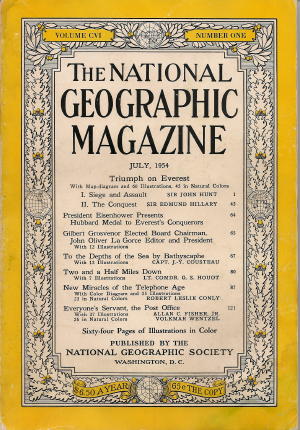PHOTOS: MAILMAN BERT VAUGHAN AND HIS U. S. MULE - National Geographic Walnut-Walker, Republished From 1954
We just retraced Bert Vaughan's steps fifty years after National Geographic did a story on his mail route between Chloe and Elmira. The path and road is improved, but there is still red earth that turns into gumbo, the area sparsely settled.
The steep hills create, beauty isolation and protection, a reminder of stout people rooted deeply into the sod these past two hundred years.
Bert told the Geographic writer about people in his part of Calhoun walking or riding a horse to get around.
That has changed, but in many ways Walker and Walnut are throw-backs to the 19th century, excluding the electric and telephone lines and the "hard road."
It has a tranquil, pastoral sense.
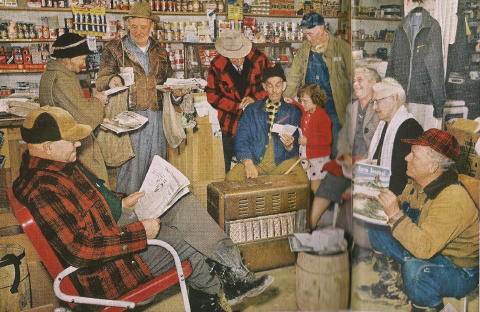
Mail and the weather are hot-stove topics in rural
West Virginia. Here 60-year-old Vaughan distributes
mail at the post office-general store in Chloe.
Identified by Mary Sue Siers Calvert (L to R) Okey Parsons, Nancy
McGeorge, Bert Vaughan, Salesman (name unknown), Henry Nichols,
Jessie Weekley, Cora Dye wife of Doctor Dye, Luther McGeorge.
Seated behind stove reading, is Jim Siers and Mary Sue Siers
Bert's daughter, 82-year-old Mabel Smith of Walker Creek, said her dad started carrying the mail in 1929, never graduating from horseback in his over thirty-year postal career. Traveling back and forth, he connected the villages of Elmira, Floe, Villanova, Walker and Chloe. He died in 1993, three months short of being 100 years old.
Two of Bert's neighbors, Nancy and Luther McGeorge of Walker, carried the mail on another route. Both have passed away in recent years.
"Dad got so tired on the saddle, he'd tie his horse to a little sapling at the McGeorge place and walk on over to Chloe," said his a daughter, Mabel. "That is a really big tree today."
Bert was first married to Belle Siers, having three children, Ruby Hensley of New Philadelphia, Ohio and Mabel Smith and Ruth Yost of Chloe. He married Anna Yost for his second wife and they had two children, Geneva Snyder of Akron and Paul Vaughan, who died in 1993.
"I've never felt at home anywhere else," concluded Mabel Smith.
Excerpts and photos included in the May 1954 edition of The National Geographic Magazine article:
EVERYONE'S SERVANT, THE POST OFFICE
Deluged By Record Mail Volume, The Postal Service Streamlines
Its Operations And Speeds Delivery With New Techniques
By Allen G. Fisher, Jr. - National Geographic Magazine Staff
With illustrations by National Geographic Photographer Volkmar Wentzel
Some areas of the country defy motorized transport of the mail. Even Philadelphia still has a few horse-drawn mail carts; they prove more efficient in narrow, congested streets. But usually old Dobbin carries postmen over rough routes in out-of-the-way places.
Just such a route, eight rugged miles long, connects the tiny towns of Chloe and Elmira in the hills of central West Virginia. There 60-year-old J.B. Vaughan, astride his pinto horse, Pat, delivers mail six days a week to about 200 hill folk.
Contractors Operate "Star" Routes
Burt, as he likes to be called, is not a regular postal employee. He operates a "star," or contract route.
Postal contracts admonish private carriers to transport the mail with "celerity, certainty, and security." Many years ago clerks tired of copying the repetitious phrase, fell into the habit of drawing three stars to indicate the words; hence, star routes.
Today (1954) there are more than 12,000 star route contractors. Some operate large enterprises with fleets of motor vehicles; others, like Burt, work alone, doing jobs that would be uneconomical for the Post office to undertake with regular employees.
Most farmers, however, receive their mail via Rural Free Delivery, a Department service employing more than 32,000 regular carriers who serve approximately nine million families.
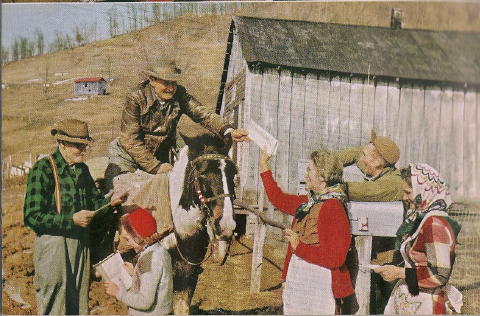
Near the postman's home, Mrs. Vaughan meets her husband to
get the days newspaper. There's mail too, for the neighbors.
Identified by Mabel Smith (L to R) Howard Metz, Carolyn Lane, Anna
Vaughan, Fountain Yost, Ruth Yost. Bert Vaughan on Pat the horse
Volkmar Wentzel and I rented horses one winter's morning and rode with Burt along his route. The wind blew gently and warm, hinting at an early spring, and the route wound pleasantly along the base of a wooded ridge.
But the conditions of the dirt road tempered our delight to the weather. Thawing snow and ice turned the red earth into gumbo, so slippery that our horses had difficulty with their footing on the slopes. Wheel ruts indicated automobile traffic, but before long the route became all but impassable for motor vehicles. Most back-countrymen, Burt said, walked or rode horseback.
We passed several comfortable frame homes. Later, as the road steepened and the hills moved in, dwellings became small and weatherbeaten, usually with unpainted board siding and tin or tar-paper roofs.
Occasionally, Burt dropped letters in roadside boxes. Shaggy Hereford cattle grazed in narrow fields, but we saw few people.
Riding at a leisurely walk, Burt talked about his work:
"Had this job 13 years; I've ridden Pat the past 12."
Did he ever bring in medicine for these people?
"Sometimes. Usually castor oil or Epsom salts. Anybody gets real sick, they take 'im out to the hospital, but mostly they do their own doctorin'. "Somebody dies, I often carry word out to the undertaker. I'm in a quartet that sings at all the funerals. Those days I hire a man to deliver the mail for me."
Did he carry messages, if people put them in their boxes?
"Well, if it's important, I'll take a note up the road. But I don't let 'em seal it - against postal regulations....
Mail-order Catalogs And Weight
"Dread mail-order catalogs. They all come on the same day, seems like, and they're awful heavy. Pat can only carry 47 pounds of mail in these saddle bags."
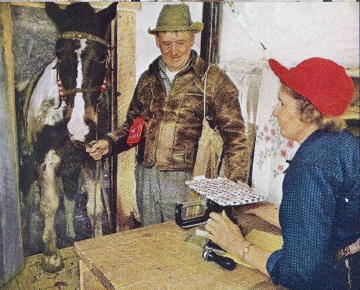
Pat, the postman's horse, supervises weighing of a parcel.
Pat has helped deliver mail for 12 years, missing only four
trips. As a private contractor, the postman receives $160 a
month. Postmistress Hazel Mollohan operates the scales in
this 8-by-10-foot frame post office at Floe, West Virginia
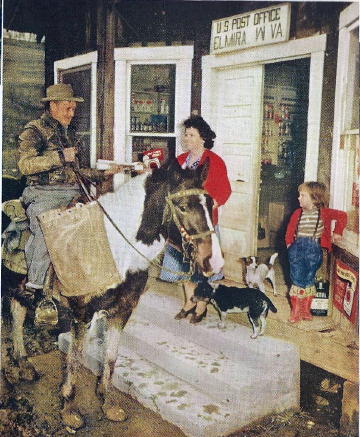
Vaughan, completing his route, hands mail to postmistress
Garnet Vaughan, a relative by marriage, at her store in Elmira
We delivered letters at two 1-room elementary schools, where children greeted Pat like an old friend, and then we climbed a 1,300-foot ridge. Here the narrow route could hardly be dignified by the word "road." Woodland enclosed us; not a field or home lined the way. It seemed as if we were in another age. delivering mail through the backwoods of a still youthful nation.
Indian-file, the three of us wound down to Elmira (one house and a post office-general store) and then retraced our route. Unused to riding, I felt as if I were astride a dull razor. But Wentzel, to my chagrin, sat his horse in comfort all the way back to Chloe.
